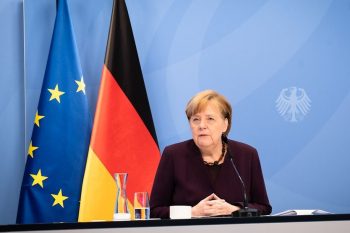
April 2, 2021 • Opinion •
Jean-Sylvestre Mongrenier has published the note « Les ambiguïtés de la politique étrangère allemande et les angles morts du tandem Paris-Berlin » (available here, in French). This article is the english translation of an article published by L’Opinion on April 2, 2021.
On the eve of the new year, the German presidency of the European Union (July-December 2020) ended with an overall victory. For his arrival a free trade agreement between Brussels and London and a “global agreement” with Beijing on investment. The “Grand Slam” was awarded to the European Union and its member states.
The latest news on euro-China relations calls us to reconsider German policies that raise questions as the balance between wealth and power moves towards Asia. Is it in Berlin about building a “geopolitical Europe” at the behest of the President of the European Commission, Ursula van der Leyen, or giving priority to the defense of its economic and commercial interests?
Let us put aside the unfortunate developments in relations between Brussels and London. This free trade agreement is of course desirable and leads to clashes and clashes with the guerrilla war over trade standards which should be feared to jeopardize stability and civil peace in Ireland. Like Michael Bornier (“Mr. Brexit”), the German Presidency aimed solely at avoiding the worst and saving the future.
“Soft stomach”. Forcing Angela Merkel to sign a “global agreement” between the European Union and the People’s Republic of China, however, raises many doubts about the substance. Remember, these talks began many years ago, long before the European Commission concluded that the People’s Republic of China was a “legitimate rival”. Although Donald Trump was previously accused of rejecting Euro-Atlantic integration to offset Beijing’s aspirations, Germany has not hesitated to explore the avenue of consultation with Joe Biden.
At the end of these talks, the Chinese party government respected the standards of the International Labor Organization and as a result did not even ban forced labor. The question of the Uyghurs, the question of the Tibetans and the Mongols, the principle of religious freedom were also removed from the mind. In this case, it is unfortunate that France bowed when Beijing had to take the bow. Undoubtedly, this would have strengthened the Chinese view of Europe on the West as a “soft foundation”: This shows the notorious diplomacy of the “wolf fighters”. It will be up to MPs and national parliaments to correct the mistakes by refusing to approve a rogue deal.
Indeed, Berlin’s emphasis on completing the Nord Stream 2 gas pipeline is no longer a guarantee of European energy autonomy or the national security of Ukraine and the region. In an effort to make up for the mistake of quickly shutting down German nuclear power plants after the Fukushima accident, Berlin is increasing Russia’s dependence on gas, which goes against the firm policy agreed by the Allies after the occupation of Ukraine.
Geopolitical revisionism. Since then, Moscow’s return to post-Soviet Eurasia from Belarus to the South Caucasus has confirmed its power plan and diagnosis in the Mediterranean and Africa: the West must face the geopolitical revisionism of Russia, a coalition with the people of China that is able to to break balance. Turkey can change.
Berlin’s primacy of short-term energy interests suggests that Germany is renewing the joys and poisons of a poor policy of balancing East and West. On the French side, the “Rapallo complex” threatens to reopen with reference to the German-Soviet treaty of 1922.
Politically, diplomatically and militarily – such ambiguities prevent Paris from claiming to build a more coherent Europe – the French expression rather than Germany as the basis for the impossibility of a “Franco-German couple”. The German heads of state and government are clearer than their French colleagues about the possibilities of such a plan and, on the other hand, about the importance of NATO for the vitality of a free Europe.
Indeed, the European Defense Plan, headed by Emmanuel Macron, is essentially a “Europe of capabilities” centered on military-industrial cooperation. Obstacles to the two major Franco-German projects, the future air warfare system and The main ground combat system (“Future Chariot”). Germany’s desire to establish itself as a leader in the European land arms industry harms Nexter, and making up for lost time in the field of military gastronomy jeopardizes the balance of learning in dealing with Paris-Berlin relations.
Useless lands. Stocks are beyond techno-industrial competition. In terms of military capabilities and technical specifications of weapons, the German calculation was primarily commercial: Europe’s only defense (necessary) and conquest of the markets within NATO. France, which is involved in the “high Mediterranean” in Africa and even in the Indo-Pacific region, is for its part pursuing a global initiative. In countries that oppose the norms of liberal democracy, it has to show its strength from afar and maintain its presence in foreign markets. The dimensions, the diplomatic imperatives and the demands of the armed forces are not one and the same.
In the end it matters. Close Franco-German relations are certainly essential for the stability of the continent. However, given the global challenges of a major Sino-Russian Eurasian and a new Beijing-facing Silk Road, Europe will not be enough. It is hard to imagine that the German Navy would come to help the French territories in the Indo-Pacific region …
In this huge spatial group the new center of world politics, the US Alliance for French Foreign Policy, the regional affiliation to “Global Britain”, will march along the Indo-Pacific Quad with India, Australia and Japan. From the Atlantic to the Indo-Pacific to the Panwest, hence the geopolitical similarities beyond the Paris-Berlin connection.
